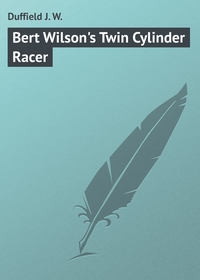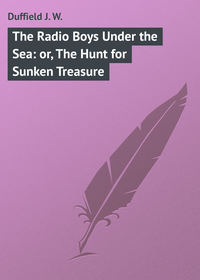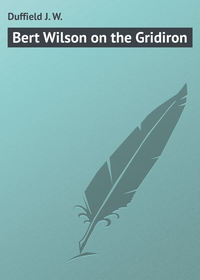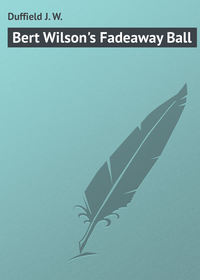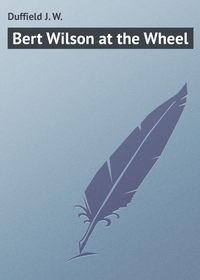 полная версия
полная версияBert Wilson, Marathon Winner
“Me neither,” the other answered in awestruck tones. “He goes off the boat madder than a March hare and comes back after a dip in the briny and a knock-out punch over one eye seemin’ as right as a trivet. It beats all.”
Meanwhile the man on the bed had been watching the men wistfully, and as O’Brien turned to him again, he asked eagerly, “Please tell me everything. I know I was out of my head, so you needn’t be afraid to tell me the truth.”
“Sure and Oi will, then,” Pat said, heartily, and he did, from beginning to end, omitting nothing.
When the tale was finished the doctor came again to have another look at his patient and was surprised and delighted at his improvement. “Why, at this rate we’ll have you up and around by this time day after to-morrow,” he cried. “What’s that?” as the stoker whispered something in his ear. “Why, yes, I guess he will come. I’ll give him your message, anyway, and see what he says.”
Then with a cheerful nod he left his patient to the enjoyment of a well-cooked, appetizing meal.
Half an hour later Bert, clad once more in dry, snug clothes, made his way hurriedly below to the stokers’ cabin. He had declined his friends’ offer to accompany him, for his instinct told him that the stoker would prefer to see him alone.
As he turned the knob of the door the stoker looked around inquiringly. Bert went forward quickly.
“I am Bert Wilson,” he said. “The doctor gave me your message and I came as soon as I could get a bite to eat.”
“It was very good of you to come, sir,” the man replied, nervously fumbling with a glass on the table at his elbow. “You see, I wanted to thank you and tell you how sorry I am that I gave you – any – trouble in the water.” His voice was scarcely above a whisper. “I can jist recollect, now, that I tried to – kill – you. Can you ever – forgive – ”
“Forgive,” Bert interrupted. “Why, I have nothing to forgive, but if I had I would have forgiven and forgotten long ago.” Then he put out his hand impulsively and said in that frank, open way that was peculiarly his own, “You and I have gone through great danger together and have managed to pull through with nothing but a few scratches to tell the story. Shall we shake hands on it?”
“Well, you sure did get everything that was coming to you, Bert,” Tom said, as they were getting ready for bed that night. “You asked for excitement – ”
“And I got it,” Bert finished, as he slipped in between the cool, inviting sheets. “Good-night, fellows, I’m off.”
CHAPTER X
Crooked Work
“Yes, me byes, there’s nothin’ in this wide world much worse, to me manner o’ thinkin’, than a ‘ringer.’” It was Reddy who spoke, following up a conversation in which most of the athletes had joined. “Crookedness is a bad thing in any line of business or amusement, but it’s specially bad in anythin’ like sport, that in its very nature ought to be kept clean and wholesome. It’s a queer thing, though, but true none the less, that there’s nothin’ much worse than some branches o’ sport. Look at prize fightin’, fer instance. O’ course, I’m not sayin’ that some fights aren’t on the level, an’ all that, but take them as a rule and the scraps and scrappers are so crooked they could hide behind a corkscrew.”
“Yes, and there are lots of other things the same way,” observed Bert, who was one of the group. “I’ve been told that wrestling is as crooked, if not more so, than boxing. Do you think it is, Reddy?”
“Well, that’s a hard question, m’ son,” returned the veteran trainer, thoughtfully. “When you get right down to it, there’s not much to choose between them. I’ve seen many a boxin’ an’ wrestlin’ bout in my time, but there’s very few that I thought was straight from start to finish. It’s a wonder to me how the fight promoters manage to keep on fooling the public. It looks to me as though a babe in arms would get wise to their game. But nix! The poor ginks will file out of a hall after a rotten go, swearing they’ll never spend a cent to see another fight, and the next week they’re back again, same as ever.”
“I guess there’s not as much underhand work in other lines of sport as in that, though, is there, Reddy?” questioned Tom.
“No, I don’t think there is,” answered Reddy, speculatively. “Of course, among amateurs, there generally isn’t the money incentive that the professionals have, and that makes a big difference. The hard thing, when you’re dealing with amateur meets, is to keep professionals out. Some club will want specially to win a race, and like as not they’ll look around for some professional, who’s not too well known, to help them out. It’s a dirty, low-down trick, o’ course, but it’s tried many a time, just the same.”
“Huh,” said Tom, “why doesn’t the amateur up and beat the professional at his own game? There’s nothing very wonderful about a man, just because he runs for money, instead of the honor.”
“Thrue fer you, me bye,” returned Reddy, smiling, “but that’s sometimes easier said than done. A man who’s running to earn his bread is usually going to run faster than the man who’s simply out fer glory. That may not sound very noble, and all that, but it’s the truth, nine times out o’ ten.”
“Yes, but how about the tenth time?” asked Bert, who had been listening attentively to all the trainer said.
“Well, once in a great while the ‘ringer’ gets tripped up, o’ course. I remember one time, many a long year ago, when I saw jist the thing you mentioned happen,” and a reminiscent smile spread over the veteran’s face.
The listening group of young athletes sensed a story at once, and assailed Reddy with requests to “fire away, and tell them about it.”
The trainer seemed in a talkative mood, and without much urging, began.
“’Twas whin I was but a young lad,” he said, “but even thin I was always interested in sport of any kind, and used to attend ivery track event for miles around the little town where I lived. I used to help around the club houses, carryin’ water and such things, and got to know, by sight at any rate, a good many well-known runners and sich.
“Well, one day there was a big college meet not far from our town, and o’ course nothin’ would do me but what I must see it.
“Accordin’ly, I was hangin’ around the club house long before the time for the race, and had plenty o’ time to size up the contestants. They were as fine lookin’ a set o’ byes as you could wish to see, and they was all jokin’ and rough-housin’ as though they had never a care on their minds. I knew they’d be in dead enough earnest in a little while, though.
“Well, the time come for them to get dressed in their runnin’ togs, and suddenly I began to sit up an’ take notice, as you might say. As one big, sthrappin’ feller, that I hadn’t noticed much before, on account o’ his havin’ kept apart a little from the others, and havin’ been so quiet-like, stood up in his runnin’ suit, it flashed across me mind that I’d seen him run some place before. At first I couldn’t place him, think as hard as I might, but suddenly I remembered where I’d seen him. It was at a race held about a year ago, and then he had run in the hundred-yard dash with professionals and had come in third.
“‘Well, what do ye know about that,’ thinks I to myself, ‘the good fer nothin’ crook is goin’ to run against these young fellers, and it’s a cinch he’ll cop off the prize.’ And, believe me, I felt sorry for the other boys that was goin’ to race against him, fer I knew he was fast, although not among the first-raters, and I figured that none o’ the others would have a show in his company.
“However, there was nothin’ I could do, for nobody would have taken my word for it, an’ I’d a’ got laughed at fer my trouble. So I kept me own council, and sat tight, but all interest in the big race was lost fer me, for I hated crooked work about as much then as I do now, I guess.
“There was a young feller from C – that I’d picked to win the hundred-yard dash, before I recognized this ringer chap. (His name was Smith, by the way, but he was known now, I found out, as Castle.) Young Sidney was a game kid, all right, from his toes up. He wasn’t very tall, and at first glance you wouldn’t think he’d be any great shakes as a runner. But he could get away at the crack o’ the pistol about as fast as any man I ever saw, barrin’ none, and he could certainly burn up the track fer a short distance. He was never much on the long distances, but he was sure class on everythin’ up to three hundred yards.
“I’d seen him run several times, and once or twice when I’d brought him a drink o’ water, or somethin’ like that, he’d grin at me an’ give me a pleasant word or two. So I had a likin’ for him, and was minded to put him wise.
“So the first chance I got I sidled up to him and tipped him off that this Castle feller was a ‘profesh.’ He gives a long whistle, and looks pretty much surprised, naturally. But he was game, clear through, and he says to me, ‘Well, kid, I don’t care if he is a professional. I’m as good a man as he is, and I think I can beat him, anyway. It’s the only chance I have, because I’m not going to squeal to the officials.’
“Well, I liked him all the more for that, and o’ course wished him all kinds o’ luck. Me heart was heavy fer him, though, for I didn’t think he would get a look-in.
“By now the time had come fer the lads to line up, and they all filed out o’ the club house, as sober as so many deacons. The starter got them in position, and everythin’ was ready fer the event. There were five starters, and each one looked to have a chance to the finish.
“‘Get on your mark! Get set!’ yelled the starter, and pointed his little pistol up in the air. Crack! she went, and the lads were off in a bunch, runnin’ as though the old Nick were after thim.
“This ‘ringer’ chap was up to all the tricks of the trade, howiver, and had ‘beat this pistol’ by the shade of an eyelash. He had a five-foot lead on young Sidney before they’d gone eight yards, and that’s an awful lot in a hundred-yard sprint. ‘Good-night,’ thinks I to meself, ‘the ringer’s won the race already,’ and the thought made me far from happy, as ye may aisily imagine.
“But the old boy himself seemed to be in young Sidney, and before I knew it my heart was in me mouth and I was almost yelling me lungs out rootin’ for him.
“He raced along in great bounds, and it seemed to me as though each stride covered ten feet. By the time they’d made half the distance he was right up to the ‘ringer’s’ shoulder, and seemed to be goin’ faster each second.
“Smith (or Castle, whichever you choose to call him) gave a glance back, and let out every bit o’ speed in him. For a second he drew away from the kid, and I was almost ready to cry, I was so disappointed.
“But Sidney was not the bye to be left behind, and he put on full steam, so to speak. By now everybody that was watchin’ the race was standin’ on their ears with excitement, and when at the seventy-five-yard mark Sidney drew right abreast of this Smith chap I thought the whole field would go wild. Pretty women an’ girls waved their parasols and shrieked at the top o’ their lungs, and as fer the men – well, they just went plumb batty.
“The other entries were practically out of the race now, and were plugging along far in the rear. The two leaders hit it up faster an’ faster, till they were fairly flying. For all he was a ‘ringer,’ the Smith chap was game, and did his best, I’ll say that for him. But young Sidney was a regular cyclone that day, and on the last ten yards jumped ahead as though the other fellow were standing still. It seemed to me he cleared the last fifteen feet in one jump, and I’ll swear he was in the air when his breast broke the ribbon.
“He’d won the race, all right, but he didn’t hear the applause that pretty nearly split the sky in two. He just crumpled up like a wet rag, and it was pretty near ten minutes before we could bring him to.
“When he did finally open his eyes, he happened to look at me first, and he grinned weakly, ‘Well, Red, we trimmed the “ringer” good and plenty, you and I, didn’t we?’ and he actually shook hands with me.
“Believe me, boys, I was the happiest kid in the State that day, bar none.”
Here Reddy stopped speaking, and gazed ruminatively out over the ocean, with what looked like a mist in his blue eyes.
After the athletes had discussed this story in all its details, Bert asked, “But what became of the ‘ringer,’ Reddy? What did they do to him?”
“Oh, there was nothing much we could do,” replied the trainer, “but, believe me, it was an awful knock to the college that put him up to it, and I don’t think they tried that trick for many a long day afterward. Believe me, lads, crookedness doesn’t pay, in sport or in anything else.”
CHAPTER XI
A Monster Peril
The good ship Northland had been traveling at reduced speed several hours, and Bert, who was always intensely interested in the operation of the vessel, was quick to notice this. At supper time the speed had not increased, and accordingly Bert took the first opportunity that presented itself to ask the captain respectfully the reason for this.
“Why, it’s this way,” he was told, “we’ve been receiving wireless messages recently that there is considerable ice in these waters, and we’re going slowly in consequence. Of course, at this time of the year, we oughtn’t to have to bother about icebergs at all, but the last winter was very long and cold, and this is the result.”
“Oh, I see,” said Bert; “but how do you know when you’re in the neighborhood of an iceberg? I should imagine it would be a rather hard object to make out.”
“No, you’re wrong there,” responded the captain. “They are very easy to see, as they emit a pale sort of glimmer that makes them very prominent at night. Of course, you never have any difficulty locating them in the daytime, fortunately. And then there’s another thing: they always chill the air for a considerable distance around them, and any sailor can tell what is threatening his ship when he feels this. Oh, no, they are easy enough to avoid, as a rule. Of course, sometimes a vessel running at high speed will not get warning of the presence of the menace until it is too late, as in a fog, for instance. In that case there is generally a report of another wreck in the morning papers a few days afterward.”
“But I should think there would be a way of detecting them by means of some instrument, say, for example, with an ordinary thermometer,” said Bert.
“Well, devices of that kind have been invented and used,” replied Captain Everett, “but in these days of high speed the warning generally comes too late, unless the ship is steaming at a very slow pace.”
“Well, then, science has been able to find nothing that is much better than the old method of a watch up in the crow’s nest. Is that the idea?” questioned Bert, in a disappointed tone. He had great faith in the ability of mechanical science to solve every problem under the sun, and accordingly he was incredulous on this point.
“So far that is true,” said the captain; “but a device has recently been patented that seems to fill the bill perfectly, as far as I can see.”
“How does that work?” queried Bert.
“Well, to explain it, you would have to have a rather exhaustive knowledge of icebergs and their habits,” said the captain, smiling; “however, I will do my best to make it clear to you. You see, an iceberg, being so much colder than the surrounding water, sets up a series of currents in the ocean, that are felt for a considerable distance. The warmer water flows toward the ’berg, and the colder water away, just as in the air the warmer air will rise and the colder air rush in to take its place. Is that plain?”
“Oh, certainly, I can understand how that works, all right,” replied Bert.
“Well, in that case, you can see how simple the rest is,” said the captain. “All you have to do is construct an instrument that will be affected by these currents, and your problem is solved. Of course that is a comparatively simple matter, and the writer of the article I read claimed to have done it. His theory seemed very plausible to me, and I would be very little surprised to see every ship equipped with his device in the near future.”
“It certainly seems feasible,” agreed Bert, “in fact, it seems so simple that it’s queer someone has not thought of it before.”
“Oh, there’s nothing surprising in that, to my way of thinking,” said Captain Everett. “Many of our greatest inventions, or rather their principles, existed long before they were put to practical use. Take steam, for example. Steam has existed from the beginning of the world, with all its power and possibilities, yet it is not until a comparatively recent date that it has been harnessed and put to work. It’s the same way with electricity, or any of a thousand things you could think of.”
“Yes, there’s no doubt but what you’re right,” admitted Bert, “but just the same, it seems too bad they couldn’t have been discovered sooner. Look at the Titanic disaster, for instance. If they had had that device that you were just telling me about installed, the whole tragedy could probably have been avoided, and the world been spared a horrible disaster.”
“It certainly does seem a pity,” agreed the captain, “but then, if everything had been discovered right off, there would have been nothing left for you or me to invent, and the world would have no work left for anyone to do. There seems to be a great plan back of these things, after all.”
“It’s too bad we haven’t something of the kind on board now,” said Bert. “It might come in handy.”
“I wouldn’t be a bit surprised,” said Captain Everett, with a worried air. “I hate to lose valuable time crawling along at this pace, but of course anything is better than what might happen if we didn’t. I don’t want to cheat old Uncle Sam out of a victory by drowning all his athletes,” and here he smiled.
“Oh, it would be a terrible loss,” agreed Bert, slyly, “specially that of yours truly. That would indeed be an irreparable calamity.”
“Oh, of course, of course,” laughed the captain. “That goes without saying, Wilson.”
At this point Reddy strolled up, and joined in the conversation. His thoughts, however, dwelt more with perfecting a certain crowd of athletes for the coming Olympic games than with inventions to warn ships of their peril, or any other kind.
After a time the captain asked Reddy how his charges were coming along.
“Oh, as well as could be expected, I suppose,” growled the trainer. Secretly he was more than satisfied with their condition, but would have died rather than admit it. “They seem more inclined to exercise their jaw muscles than anything else, but otherwise they’re not so awful bad.”
“That’s rather negative praise,” laughed Bert, “but we know very well that if we weren’t all right Reddy would be exercising his ‘jaw muscles’ more than he does, so we have to be satisfied with that.”
Reddy grinned, but made no reply, and shortly afterward sauntered off. After a little further conversation with the captain, Bert followed suit, and strolled up into the bows, where a man was on lookout.
The sailor was gazing intently ahead, and did not look up at the sound of Bert’s approach, or even when he spoke to him. He knew that the safety of the whole ship and those on board rested on him, and he was taking no chances.
He answered Bert’s salutation civilly enough, however, but answered his questions only in monosyllables, and Bert soon gave him up as a bad job. He realized, moreover, that the man was right, as it was against the ship’s rules to talk while on duty.
So Bert leaned against the bulwarks in silence, having little else to do at the time, and gazed ahead in an abstracted fashion. No sound was to be heard save the wash of the water against the bows, and occasionally a shout or laugh from the athletes amidships.
Suddenly Bert was roused from his reverie by a call from the lookout.
“Ice ahead! Ice ahead!” yelled the sailor, and dashed madly toward the stern, waving his arms wildly.
Bert gazed intently ahead, and could faintly make out a luminous mass some distance from the ship, but directly in its path. He was conscious of a feeling of damp chill in the air, too, and felt that they were nearing an iceberg. Suddenly the vibration of the engines ceased, and then started again, and Bert knew they had been reversed. The ship seemed to lose little of its speed at first, though, and the huge ’berg loomed up closer and closer. The helm had been put over, and the ship swung around obediently, and so approached the ’berg at an angle. Shouts and cries arose from the crew and some of the passengers, and it was an exciting moment.
Gradually the ship lost its momentum under the reverse pull of the big propellers, but to Bert it seemed impossible that they could stop in time. Nearer and nearer they came, and the ship seemed wrapped in an icy fog. Now Bert could make out details of the ’berg, and even in such a time as this, when it seemed that he was approaching certain death, he noted idly the huge spires and needles of ice that rose into the blue sky like church steeples.
Now the good ship was almost touching the ’berg, but was at a long angle with it. Bert saw that the impact would not be as great as he had at first imagined, but nevertheless he awaited it with bated breath.
Then it came – a jarring, grinding, glancing blow, and the ship trembled from bow to stern. Huge fragments of ice clattered down on her decks, and some of her crew were badly hurt by flying ice splinters.
There was great confusion then, and a few of the crew started a rush for the boats, but were met before they could get there by Captain Everett and his first and second officers, all with revolvers in their hands.
“Back there! Back!” shouted the captain, and his ordinarily mild eyes blazed with an angry light. “The first man who moves another step forward dies! Get back to your posts, every one of you, and be glad I don’t shoot you like the dogs you are!”
Cowed by his determined demeanor, and that of the other officers, the men slunk back, and Captain Everett set about finding what damage had been done. Two sailors were sent below to inspect the hold, and the captain awaited their report with keen anxiety.
Soon the two men returned, and one said: “There seems to be nothing the matter, sir, as far as we can make out. She doesn’t seem to be taking in any water.”
“That’s well!” exclaimed the captain, after the two men had saluted and gone forward. “It’s barely possible that the ship may not be much damaged, after all, although it seems almost incredible. However, we won’t find any fault with providence if it isn’t.”
Strange as it may seem, by what appeared to be almost a miracle the ship had come off from the encounter with a few bent bow plates and the loss of considerable paint.
Before long the ship had resumed its course, and the iceberg was falling rapidly to the rear. Bert had been the only person in the vessel’s bows at the time of the collision, and he was soon encircled by a group of athletes anxious to hear the story.
“Believe me, fellows,” he said, in a sober voice, “I gave us all up for lost. I thought our goose had been cooked, sure. Why, that ’berg looked as high as a mountain to me, and if we had hit it head-on it would have been all over but the shouting. It’s a lucky thing the captain got warning in time to veer the steamer around a little.”
Everybody realized that they had had a very close escape from death, and for the rest of the day little else was talked about. It was just such a collision as had been responsible for the speedy sinking of the great liner Titanic with over two thousand souls on board. That ship had struck a glancing blow, in the same way that the Northland had, but was less fortunate as to the result. A great projecting sliver of ice had penetrated the ill-fated vessel’s hull, and within a few hours she was lying at the bottom of the sea. Indeed, at the present moment they were but a short distance from the leviathan’s last resting place, and this made them realize all the more strongly what a miraculous escape they had had.
Needless to say, every precaution was taken to insure against a repetition of their recent experience, and the ship fairly crawled along at one-quarter speed. They sighted other ’bergs at intervals, but never near enough to give them any concern, and a day or so later were safely out of the danger zone. Then Captain Everett ordered full speed resumed, and the Northland began to plow through the blue water at its customary good clip.


